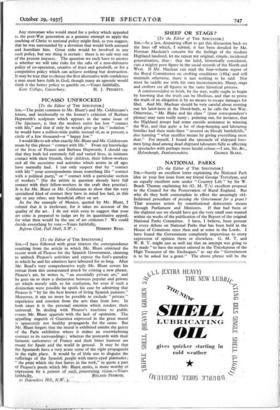[To the Editor of THE SPECTATOR.]
STR.,—i have followed with great interest the correspondence resulting from the article in which Mr. Blunt criticised the recent work of Picasso for the Spanish Government, claiming to unfrock Picasso's activities and expose the fool's paradise in which he and his admirers have laboured for so long. After Mr: 'Read's very comprehensive reply Mr. Blunt covers his retreat from this unwarranted attack by coining a new phrase.
Picasso's art, he writes is, " an essentially private art," and he goes on to draw a distinction between popular and private art which merely adds to his confusion, for even if such a distinction were possible he spoils his case by admitting that PiCasso is " by Tar the best known of living Spanish painters."
Moreover, it can no more be possible to 'exclude " private " experience and emotion from the arts than from love. In both cases it is the personal emotion which renders them
universal. In dealing with Picasso's reactions to public events Mr. Blunt quarrels with the lack of optimism. The appalling anguish of Guernica expressed in the- great mural
is apparently not healthy propaganda for the cause. But Mr. Blunt forgets that the mural is exhibited amidst the gaiety of the Paris exhibition where it makes an overwhelming contrast to its surroundings ; Whereas the postcards with their
fantastic caricatures of Franco and their bitter humour are meant for Spain and the world in general. It may be that the Sigtniards have a very acute sense of the right propaganda in the right place. It would be of little use to disguise the sufferings of the Spanish .peopie with starry-eyed **tides ; " the print which the foot leaves in the rock," to quote a part of Picasso's P°egl which Mr. 414!?t:Plni!:.q/ morewortIlY: expression. by fa. painter of suchi,penetrating vision.—Yours
21 Dawnshire . .


























































 Previous page
Previous page